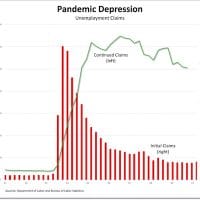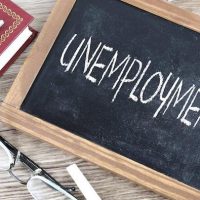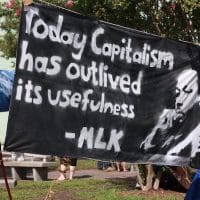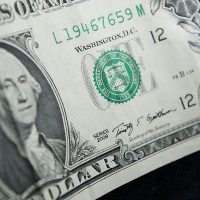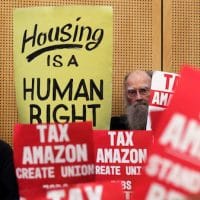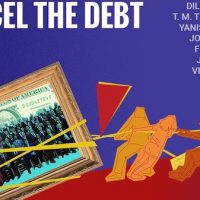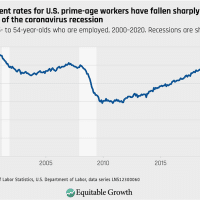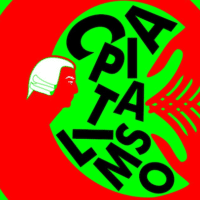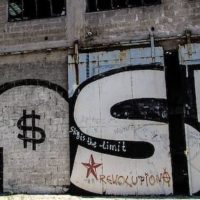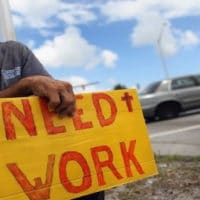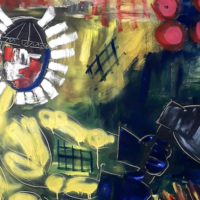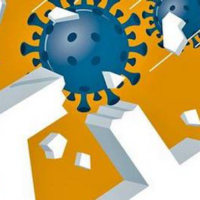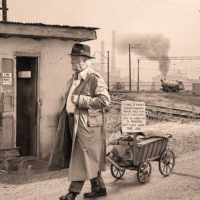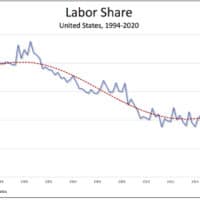-
Chart of the day
U.S. billionaires have recouped all of their wealth—and more—during the Pandemic Depression. Meanwhile, since May, the number of poor Americans has grown by about 8 million.
-
A missing pledge in the 2020 Democratic Party platform
For 52 years—from 1936 to 1988—the Democratic Party pledged support for the achievement of full or maximum employment.
-
Deutsche Bank money laundering scandal could create greatest economic crisis in history
The leak of the FinCEN Files over the weekend has rocked global markets and augurs a financial crisis of epic proportions as Deutsche Bank hovers over the precipice.
-
Beyond the mainstream
This is certainly not the first time people have looked beyond mainstream economics.
-
The protracted crisis of capitalism
THERE is a commonly-held view that the current crisis in capitalism, which has resulted in a massive output contraction and increase in unemployment, is because of the pandemic; and that once the pandemic gets over, things will go back to “normal”.
-
“A disturbing milestone”: America’s top 12 plutocrats now own $1 Trillion in wealth
New figures from the Institute for Policy Studies show that, despite a pandemic that has stunted the economy for months, America’s billionaire class is becoming richer than ever, adding nearly $700 billion to their fortune since the nationwide lockdown in March.
-
Leftist leaders call for cancellation of debts owed by developing countries
A statement signed by former Brazilian president Dilma Rousseff and Indian Kerala State’s finance minister Thomas Isaac, among others, highlights the inadequacy of the measures announced recently by the G20 and IMF to postpone debt repayment.
-
Some are in super-yachts and others are clinging to drifting debris
COVID-19 has exposed the lie that free markets can deliver healthcare for all, the fiction that unpaid care work isn’t work, the delusion that we live in a post-racist world. We are all floating on the same sea, but some are in super-yachts and others clinging to drifting debris.
-
Laos has tackled COVID-19, but it is drowning in debt to international finance
On June 11, Laos (Lao People’s Democratic Republic)—a country of 7 million in Southeast Asia—said it had temporarily prevailed over COVID-19.
-
Congress is a month away from cutting the economy’s fiscal life support
The most important economic problem the United States is facing is the failure to contain Coronavirus and the unethical decisions politicians have been making to reopen without the administrative capacity to limit the virus’s spread.
-
Ten-Point agenda for the Global South after COVID-19
In 1974, the United Nations General Assembly passed a New International Economic Order (NIEO), which was driven by the Non-Aligned Movement (NAM).
-
The problem of external debt
There is a massive problem of external debt building up for the third world, of which the recent Argentine debt crisis was only one manifestation. At the root of the problem is the collapse of primary commodity prices in the world market which began in April 2011.
-
Catastrophe capitalism and the COVID-19 crisis
ÖŞK: In an interview with Michael D. Yates (“Trump, neo-fascism, and the COVID-19 Pandemic,”April 11, 2020, MR Online) you mentioned that “Capitalism is in its biggest crisis this century.” What makes this crisis the “biggest”? What will the outcome of this crisis look like? Will this crisis and failure lead to a major change in […]
-
Facing the ecosocial crisis: Is a socialist planning of the economy feasible?
The current ecological and social crisis, a crisis which has seen its effects increased by a public health emergency caused by the COVID-19 pandemic, is a crisis which raises serious concerns over environmental sustainability and social polarization and which has a fundamental cause: the blind logic pursued by our economy system, where everything is secondary to profits.
-
Econ-apocalypse: economic and social aspects of the coronavirus crisis
In this historical conjuncture we are faced with the risk of a double temporality. The double temporality that I have in mind is that between saying, ‘now let’s make the economy restart quickly’, adding ‘later we will think about its contents’. It is an illusion. And a dangerous illusion.
-
U.S. jobless rate broke depression-era record—but most media missed it
The Bureau of Labor Statistics’ eagerly awaited Friday morning Official Unemployment Rate report for April—what editors generally call the BLS’s “headline” rate of unemployment—was definitely headline-worthy.
-
Hunger gnaws at the edges of the World
On 21 April, the head of the UN World Food Programme (WFP) David Beasley said that the world was experiencing a ‘hunger pandemic’. That day, the Global Network Against Food Crises and the Food Security Information Network released the 2020 Global Report on Food Crises.
-
Growth figures underscore economic crisis amidst COVID
Early evidence on the intensity and drivers of the COVID-induced crisis in the U.S. and Europe suggests that the official response may lengthen the recession and delay recovery
-
The 1930s and now: Looking back to move forward
While there are great differences between the crises and political movements and possibilities of the 1930s and now, there are also important lessons that can be learned from the efforts of activists to build mass movements for social transformation during the Great Depression. My aim in this paper is to illuminate the challenges faced and choices made by these activists and draw out some of the relevant lessons for contemporary activists seeking to advance a Green New Deal.
-
Reserve army—pandemic edition
In particular, the existence of a reserve army serves to discipline labor, keeping its wage demands in check, since employed workers are forced to compete with unemployed and underemployed workers for the available jobs.

